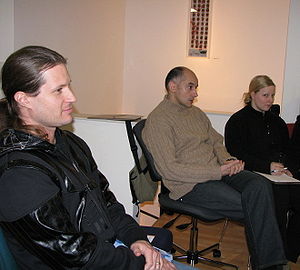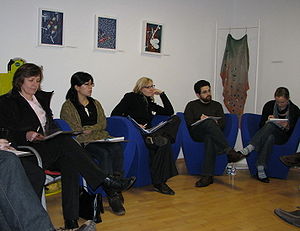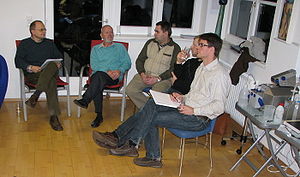MiPNet14.12 QA-Workshop
| Quality assurance in respirometric diagnosis of mitochondrial function. MiPNet Workshop 9-10 Dec 2009. Mitochondr Physiol Network 14.12: 1-13. |
» ![]() »Versions
»Versions
Oroboros (2009) Mitochondr Physiol Network
Abstract: • Keywords: MitoPathways
• O2k-Network Lab: AT Innsbruck Oroboros
Labels:
Towards Quality Assurance
Quality Assurance (QA) is too big a term for a small workshop on diagnosis of mitochondrial (mt) respiratory function, even when the focus is restricted to the model of permeabilized muscle fibres. There are several milestones in the quest towards QA, including continuous quality control and incorporating ‘Best Practice’ in the laboratory. We are well aware of the fact that in practice we may aim at better standards, but will hardly ever establish any final best. QA in general may set impractically high demands on a laboratory, hence the required level of QA depends on the specific application. QA will be different in (i) an experimental study on mt-respiratory function of mouse skeletal muscle, (ii) a comparison of aged humans versus young controls using biopsies, or (iii) the diagnosis of a mt-myopathy in a single patient when an individual is evaluated (she/he really cares) versus a (matched – science has to care) control group.
Against this background, we can reach several unambiguous conclusions:
- 1. Some level of QA is required in all studies on mt-respiratory function – from basic science to clinical applications.
- 2. Sharing the practical expertise of different research groups in this rapidly expanding field provides an effective and economical approach towards higher standards of science by implementing QA.
- 3. Multiple benefits will result from the development and application of appropriate standards of QA - for the individual patient (very few laboratories are involved), the individual scientist (all of us, all of our collaborators), the laboratory, mt-respiratory physiology in terms of scientific reputation (including some companies with positive or negative impacts), the particular segment of our health care system.
The benefits and implications are potentially enormous, considering the impact of mitochondrial medicine on the quality of life: life style related to exercise and nutrition, obesity, degenerative diseases, metabolic syndrome, muscular and cognitive dysfunction, rare mt-diseases, healthy aging, cardiovascular diseases, reducing the risks for a range of cancers, immunological fitness, competitive and noncompetitive sports, hypoxia, ischemia-reperfusion, ...
It is far more exciting to discuss these challenging topics than to talk about quality control of the chemicals used as inhibitors or in mitochondrial respiration media, tissue wet weight or dry weight measurements, or about valid estimates of the proton leak in a respirometric protocol. A focus on QA, however, helps to eliminate unreliable data which are a source of confusion, lead to unnecessary controversies, or even overshadow the potential of accurate diagnosis of a disease. Explicit implementation of QA will provide a basis of increased recognition and reputation of our field of research, and may be considered as an expression of corporate social responsibility within the mitochondrial physiology network. This MiPNet QA-Workshop includes but is not restricted to instrumental performance, and presentations are invited to cover not only applications of the Oroboros Oxygraph-2k but also extend the discussion to other instruments
Aims
The topics and aims of the proposed workshop on ‘Respirometry of permeabilized muscle fibres: towards quality assurance in the diagnosis of mitochondrial function’ are:
- 1. Presentation of presently available components of QA: methodological details, exchange of laboratory protocols with updates.
- 2. Science sessions: protocols, traces, results, concepts, perspectives.
- 3. Summary of practically important segments and perspectives of QA.
Is it worthwhile considering a joint project application? Can you come up with specific suggestions? Some of the workshop participants will attend the subsequent Course on High-Resolution Respirometry (IOC54; Schröcken, Austria), during which we might complete and extend the summary from the workshop in a small group.
Participants
Summary
- The workshop group wants to continue this discussion and move towards a more formal QA-approach, preferentially forming a working group within the MiPsociety, and linking to other societies. A circular should be sent to all MiPmembers, with the summary of the QA workshop, future perspectives, and questions on feedback. A special evening session might be devoted to QA at MiP2010 (but will there be sufficient time?).
- QA working group: The QA workshop and related correspondence showed that there is a critical mass for a working group; avoid forming a closed group of ‘insiders’, remain open but focused. The special topic of respirometry of permeabilized muscle fibres appears to be adequate and manageable as a first step, whereas the general correspondence suggest a broader perspective (including isolated mitochondria, intact and permeabilized cultured and primary cells) for future QA workshops.
- Publication: Methods paper on the basis of a series of QA workshops; possible key words are:
- Methods of taking biopsies
- Sample handling and sample preservation
- Respirometric instruments
- Experimental conditions (temperature; media; controls incl. cyt c test; oxygen levels)
- Wet weight/dry weight; normalization of respirometric flux
- Mechanical separation of fibres
- Permeabilization of fibres (concentration of sponin, time, temperature, washes)
- Substrate concentrations (how to evaluate correct or optimal concentration; stock solution preparation)
- Miminal protocol (evaluation; minimal protocol for comparison and quality control)
- Pitfalls
- Exclusion criteria
- The methods paper should include a meta-analysis of published data
- QA website: Place for protocols, study design, information for researchers on groups who are doing similar work.
- Towards QA is a theme of Gentle Science.
Impressions












